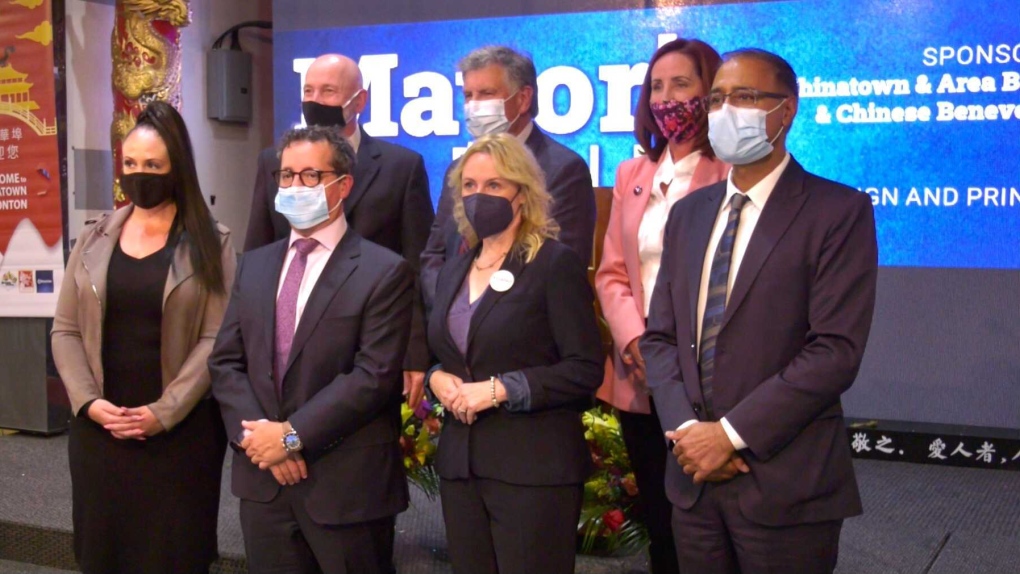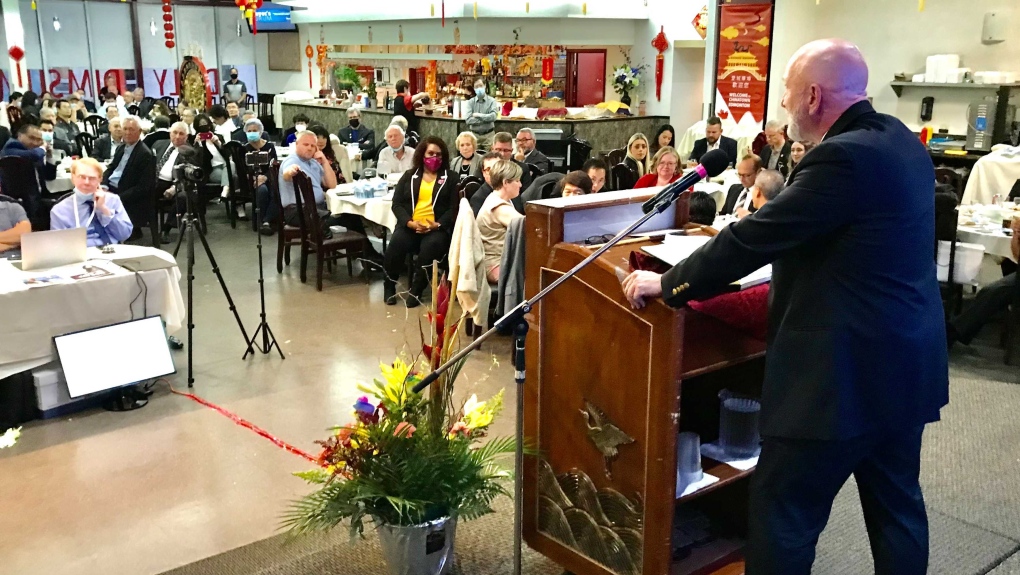Mayoral candidates asked to remove supervised injection sites 'out of Chinatown'
 Candidates at a mayoral forum. Tuesday Sept. 14, 2021 (Sean Amato/CTV News Edmonton)
Candidates at a mayoral forum. Tuesday Sept. 14, 2021 (Sean Amato/CTV News Edmonton)
Seven people trying to become the next mayor of Edmonton faced off in another forum Tuesday night - this one focused on the “problems of Chinatown” - a term coined by the evening’s moderator.
Former mayor Bill Smith said Chinatown has serious concerns with petty and violent crime, which he said are being “escalated” by the presence of supervised injection sites.
He asked candidates how, not if, they will remove all of the sites from Chinatown.
“With the three injection sites, in one close proximity in one community, is really a big mistake. Nobody would stand for that anywhere else in the city. They’ve dumped it here in Chinatown and I hope whoever is going to be the mayor deals with it,” Smith said in an interview.
The event was held in a busy restaurant on 97 Street and hosted by the Chinatown & Area Business Association and the Chinese Benevolent Association.
Mayoral candidates Amarjeet Sohi, Mike Nickel, Michael Oshry, Cheryll Watson, Rick Comrie, Kim Krushell and Diana Steele all attended.
Each candidate was asked individually how they will remove the injection sites.
“It is not compassionate to let these people to continue to walk the streets. It is broken. These people are broken. They need treatment for trauma and addiction,” Nickel said, not directly addressing the question about removing sites.
 Mike Nickel at mayoral forum. Tuesday Sept. 14, 2021 (Sean Amato/CTV News Edmonton)
Mike Nickel at mayoral forum. Tuesday Sept. 14, 2021 (Sean Amato/CTV News Edmonton)
“You can build more housing if you want to, but that does not get people off the streets where they need treatment for trauma and addiction. That is a long-term solution,” he said.
He added he will not “defund the police” and provide that funding for social supports.
Oshry spoke about his promise to build 1,000 supportive housing units and convert old busses to provide showers and washrooms in the inner city.
He wants to add police in Chinatown and spread supportive housing out more evenly across the city.
Oshry did not commit to removing all the sites either.
“(Addiction) is not a personality flaw, it’s a medical condition and they need support…that being said, having a concentration in one neighbourhood is not appropriate. My idea would be to have one location in the city and then move them around the city,” Oshry said.
None of the candidates suggested specific alternative sites.
Krushell said she was open to relocating sites - but not because of crime. She believes the sites need to be spread out to provide better services.
“Harm reduction sites do save lives, but what I’m hearing…it doesn’t make sense to concentrate injection sites in one location. So what I’m calling for is that we review the locations and we look at where the actual need is,” she said.
Sohi said he would work to convince other orders of government to invest in supportive housing and addiction support.
“I hear you. I know these issues have affected you, your businesses, your lives, and your safety. And you have more on your shoulders, the burden, that’s unreasonable,” he told the room.
Watson said she’s spoken with social agencies who don’t believe the sites should be centred in Chinatown.
“My commitment is to work collaboratively with those agencies to find the right areas in our city to distribute those services,” she promised.
A 2020 report released by a Government of Alberta panel found that 911 calls generally increased near supervised injection sites, except in Edmonton.
Supervised injection sites “help save lives and build safer communities,” according to the Alberta Health Services website.
The Edmonton election is Oct. 18.
CTVNews.ca Top Stories

Trudeau promoting backbenchers in sizable cabinet shuffle coming Friday: sources
Prime Minister Justin Trudeau is planning a sizable cabinet shuffle on Friday, and it's shaping up to see several Liberal backbenchers promoted to ministerial posts, sources confirm to CTV News.
Prime minister's team blindsided by Freeland's resignation: source
The first time anyone in the senior ranks of Prime Minister Justin Trudeau's office got any indication Chrystia Freeland was about to resign from cabinet was just two hours before she made the announcement on social media, a senior government source tells CTV News.
'Tragic and sudden loss': Toronto police ID officer who died after suspected medical episode while on duty
A police officer who died after having a suspected medical episode on duty was executing a search warrant in connection with an ongoing robbery investigation in North York, Toronto police confirmed Thursday.
Ontario town seeks judicial review after being fined $15K for refusing to observe Pride Month
An Ontario community fined $15,000 for not celebrating Pride Month is asking a judge to review the decision.
The Royal Family unveils new Christmas cards with heartwarming family photos
The Royal Family is spreading holiday cheer with newly released Christmas cards.
EXCLUSIVE Canada's immigration laws 'too lax,' Trump's border czar says
Amid a potential tariff threat that is one month away, U.S. president-elect Donald Trump's border czar Tom Homan is calling talks with Canada over border security 'positive' but says he is still waiting to hear details.
Who received the longest jail terms in the Gisele Pelicot rape trial?
A French court found all 51 defendants guilty on Thursday in a mass rape case including Dominique Pelicot, who repeatedly drugged his then wife, Gisele, and allowed dozens of strangers into the family home to rape her.
Crowd crush kills 35 children at funfair in Nigeria, police say
At least 35 children were killed and six others critically injured in a crowd crush at a funfair in southwest Nigeria on Wednesday, police said.
Scientists think they know why Stonehenge was rebuilt thousands of years ago
Scientists made a major discovery this year linked to Stonehenge — one of humanity’s biggest mysteries — and the revelations keep coming.

































